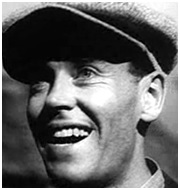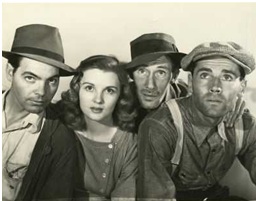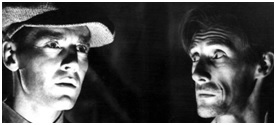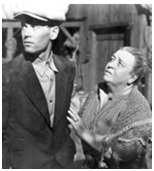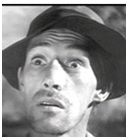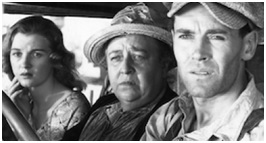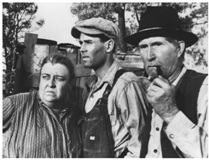|
 |
|
 |
|
|
||
The Grapes of Wrath - Business Ethics and Corporate Social
Responsibility
The Grapes of Wrath (1940)
Famous for...
Set in... America in the mid-1930’s.
Based on... American John Steinbeck’s novel, The Grapes of Wrath.
Director John Ford who also won an Oscar for:
Oscars Two for a) best director b) best supporting actress (Jane Darwell as Ma Joad). Key characters Tom Joad (Henry Fonda), the hero (pictured right). Ma Joad (Jane Darwell), his mother. Jim Casy (John Carradine), his friend.
The story After four years’ imprisonment for manslaughter (killing someone in self-defence in a bar brawl), Tom Joad returns to his family’s rented farm in Oklahoma with his friend, Jim Casy (an ex-preacher). But the family has been evicted and is now living at Uncle John’s farm nearby. They explain
that they’re going to California with all their possessions on an old truck. Tom's mother, Ma, has
to leave behind things that painfully remind her of happy memories. Tom and Jim join Tom's family
(from left to right Connie, Rosaharn, Jim and Tom are pictured right). Heartbroken Grandpa and Grandma die on the journey, during which some people are kind but others privately deride them as “Okies” who “ain’t human”. They are concerned on meeting a man, returning from California, who tells them that migrant workers are being poorly paid and badly treated. But they are heartened by a waitress who kindly gives some under-priced candy to Winfield and Ruthie, Tom's youngest brother and sister. When they arrive in California, they are told by a policeman there is no work, and they must go to the Hooverville camp. It is full of starving, unemployed migrants, one of whom, Floyd:
To help him escape, Tom and Jim (pictured right) stop and kick the policeman. Jim takes the blame (because Tom is on parole) and is arrested. Tom is angry about the migrants’ exploitation, but Ma tells him to stay out of trouble to keep the family together. He consoles Rosasharn after her husband, Connie, deserts her. The Joads then manage to escape from an angry mob of Californians, planning to burn down the camp because they think the migrants are taking their jobs. The Joads move to the Keene Fruit Ranch, where they are offered work as peach pickers to break a strike organized by Jim who is attempting to create a union. But Tom doesn’t encourage the other strike breaking pickers to join the strike. Jim is clubbed to death by a guard whom Tom kills. The strike is broken and the pickers’ wages are halved, as Jim predicted. The Joads then move to a clean, well run government camp and are employed by a kind farmer, Mr.
Thomas. He warns Tom about a plot to cause trouble at the Saturday night camp dance to get “red”
(pro-union) agitators arrested. Tom helps to thwart this plan. Ma (pictured right with Tom) wants to keep the family together but sadly accepts that Tom must leave to escape the police. He vows to carry on Jim’s work of organizing unions to help the poor. Ma overcomes her misery with defiant optimism about the future (this contrasts with the bleak ending in John Steinbeck’s novel in which Rosasharn breast feeds a starving man after the loss of her stillborn child).
Lessons for business ethics and corporate social responsibility
1. Profit can hurt people The tenant farmers in Oklahoma (like the Joads) are evicted by their land owners, because it is more profitable to have bigger farms with tractors. In California there are some kind employers (like Mr. Thomas) but many of them exploit the migrants with low wages. Jim and then Tom try to organize unions which are violently discouraged (helped by the ruthless police).
2. Love everybody Ex-preacher, Jim Casy (pictured right), says that his only religion is to “love everybody”. Just like Jesus Christ (Jim is deliberately given the same initials), he sacrifices himself for others:
Similar to Jesus’s words on the cross, Jim tells his killer: “You don’t know what you’re doin’” . 3. Co-operation is cool The migrants are strongest and happiest when they accept their interdependence and work together for a better life. This is Jim’s philosophy and is repeated by Tom: “A fella ain’t got a soul of his own, just a little of a big soul – the one big soul that belongs to ever’body”.
4. Integrity inspires Jim’s example inspires Tom to carry on his work of helping the poor. Jim says: “All that lives is holy”,
5. People matter more than possessions Ma (pictured right with Rosasharn and Tom) is more concerned about her family than the possessions she has to leave behind in Oklahoma. Tom and Jim also put people first. The film shows how life's problems (like poverty and exploitation) can be conquered by:
6. Make the most of the future Ma wisely realizes that memories are magical, but you can’t live in the past. Despite intense hostility to “Okies” like herself, she is:
7. Family matters The Joad family (led by Ma) support each other through thick and thin. At the end of the film, Ma says she will lead them out of their problems, because women are strong like a river that “goes right on”. (Ma and Pa are pictured right with Tom)
Key quotes on workers and unions They’re workin’ away on our spirits, tryin’ to make us cringe and crawl, workin’ on our decency, Tom (to Ma). You don’t know what you’re doin’. You’re helping to starve kids, Jim (to his killer).
Key quotes on ethics All that lives is holy, Jim. You do what you had to do, Ma (to Tom). Maybe there ain't no sin, and there ain't no virtue. There's just what people does, Jim.
Key quote on society We’ll go on forever, Pa, ‘cause we’re the people, Ma’s final line in the film.
Key quote on learning Tom, you gotta learn like I'm learnin'. I don't know what's right yet, myself, but I'm tryin' to find out...I gotta ask, Jim.
Key quote on corporate social responsibility A fella ain’t got a soul of his own, just a little of a big soul – the one big soul that belongs to ever’body, Tom.
Two film websites to recommend 1. filmsite.org (run by Tim Dirks). 2. aveleyman.com (run by Tony Sullivan) |
|
|
||
|
|
||
| Copyright © wisdomtowin.com 2025 All Rights Reserved | ||
|



